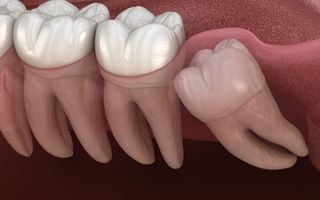
A dental tooth extraction involves the careful removal of a tooth from its socket in the jawbone. This procedure becomes necessary for a variety of reasons, including severe decay, irreparable damage, wisdom teeth growth, or the need to create space for orthodontic treatment.
What are wisdom teeth?
When most people are in their late teens or early twenties, their wisdom teeth will erupt. These four teeth - two on the top and two on the bottom - are located at the very back of the mouth. Wisdom teeth are the last adult teeth to come through, and are also referred to as the "third molars" or even "18-year-old molars".
There is a certain percentage of the population who don't even have wisdom teeth, or not all four at least. This is perfectly normal, and not having wisdom teeth is hereditary.
For a small percentage of people, their wisdom teeth erupting is uneventful and without complications. And yet for others, their wisdom teeth can become painful and infected. In those cases, wisdom tooth removal may be the best option. If you are having problems with your wisdom teeth, our dentists are here to help.
When do I need to get my wisdom teeth removed?
In teenagers and young adults, wisdom teeth can be monitored via dental x-rays before they erupt. These x-rays will show if your wisdom teeth are present below the gum line and if there is room in your mouth for them to come in. In some cases, dentists may recommend wisdom tooth removal even if you aren't yet having discomfort or pain.
Wisdom teeth that cannot fully come in are called impacted, which means they may erupt at an angle. In these cases, wisdom teeth can cause damage to surrounding teeth and soft tissue by exerting pressure on them. Some impacted teeth only partially erupt, creating a flap of gum tissue. Food and other debris can become trapped between the tissue flap and the tooth, resulting in an infection.

3D render of an impacted wisdom tooth
Additionally, cysts can form around impacted teeth. Cysts are pockets of fluid that can damage bone, surrounding teeth, and gums. Antibiotics can treat infections, but in many instances, removing wisdom teeth is necessary to permanently treat the problem.
Preparing for a tooth extraction
You will need to have a consultation with your dentist to confirm that your pain and discomfort is caused by your teeth. If you are having the procedure under general anaesthesia, your dentist will give you instructions on how long you need to fast for before surgery.
You will also need to organise for someone to pick you up, as you shouldn't drive after having general anaesthesia or sedatives.
Recovering from a tooth extraction
Your dentist will give you personalised post-op instructions, but there are also some general guidelines you should follow. After your teeth are removed, jaw swelling; pain; and some bleeding are normal. Using ice packs can help to reduce swelling and if bleeding does occur, apply pressure with clean gauze.

Patient at home resting post-tooth extraction
Your dentist will advise you on what over-the-counter pain medications to take and may prescribe, or recommend certain medications. You may or may not need antibiotics, depending on a variety of factors, and you must drink plenty of water. You should also avoid smoking, vaping, or drinking out of a straw during your recovery as these activities create a suction, which can increase your risk of developing a dry socket.
For most people, pain and discomfort resolve over a week. Plan to have help around the house for a day or two, as you should take it easy and rest. You will need to eat soft foods after your tooth extraction, so plan meals ahead of time. Hot food and beverages should also be avoided for the first 24 hours.
If you're experiencing any of these symptoms, please get in touch. Food and other debris can become caught in a dry socket and result in an infection. Throughout your recovery, we will be there to answer any of your questions.
Get in touch with our friendly team to schedule an appointment.
Frequently asked questions
The cost of tooth extraction varies, depending on how difficult they are to remove, where the procedure is performed and who performs it. Delaying tooth removals can lead to more complications, resulting in not only pain but additional costs.
On average the recovery time for a tooth extraction is 1-2 weeks. However, most people can back to their normal routine within 3-5 days.
Your dentist will provide post-operative instructions to keep your comfortable while you heal.
Dry socket is a complication that can occur after any tooth removal. When teeth are extracted, a blood clot forms over the extraction site. This clot protects bones and nerve endings. If the clot doesn't form or later becomes dislodged, a dry socket can result.
Dry socket typically occurs 1-3 days after your wisdom teeth are removed, and symptoms include:
- Severe pain that gets worse and is not lessened by medication.
- Pain radiating on the same side of your face as the extraction.
- Bad taste or odour in the mouth.
- Seeing visible bone.

